News
(Salem, Ore) – In a new study, Oregon families in three priority populations shared their experiences and insights about child care, their struggles to find high-quality, affordable care that meets their needs, and their actionable recommendations for how to improve Oregon’s early learning system. The Oregon Early Learning Division (ELD) commissioned researchers from the Center for Improvement of Child and Families Services at Portland State University to conduct this study funded by the federal Birth-to-Five Preschool Development Grant.
Eighty-one families participated in interviews or focus groups for this research. The ELD chose to prioritize the following populations because they had not been a focus of previous work and their experiences are critical to informing Oregon’s work to create a more equitable early learning system:
- Families with a child under age five who was suspended or expelled from an early learning program;
- Families with infants and toddlers and who (a) identify as African American/Black; (b) are Spanish speaking and live in rural and non-urban areas of Oregon; (c) identify as Native American/American Indian; or (d) are English speaking and live in rural Oregon;
- Families with a child aged 0–5 years and who identify as part of the LGBTQIA+ community.
Among the key findings, families reported a clear need for more affordable, high-quality child care options. This included having child care providers who spoke their home languages, who reflected their racial, ethnic, and/or cultural backgrounds, who were part of the LGBTQIA+ community, who were located closer to them (especially in rural parts of Oregon), who were able to meet their children’s medical, developmental, and/or behavioral needs, and who they felt they could trust to provide nurturing, safe, and culturally appropriate care.
“Child care is a critical support to working families and this report highlights what families have long known – that high quality, inclusive, and culturally appropriate child care is inaccessible across Oregon,” said Oregon Early Learning System Director Alyssa Chatterjee. “Now, more than ever, we need to see investments in child care that expand access and reduces this burden for our families.”
Families also described ongoing challenges and limited available supports in their search for quality child care and other resources. For example, families spoke about waiting from six months to three years on child care waiting lists, and shared compelling stories about the emotional and financial burdens they experienced. Others talked about compromises they made to find, afford, and use child care that would work well for their child and their family.
“While there were a few differences across the families we spoke with, their stories and recommendations were overwhelming similar – Oregon lacks sufficient options to meet the child care needs,” said Portland State University Lead Researcher Beth Green. “Families are bending over backwards to do the best they can for their children, at considerable emotional, personal, and financial cost to themselves.”
The full reports include direct quotes from families, information about the unique experiences and recommendations of families, and more detailed summaries of the key findings. The three reports – one per priority population – and executive summary are posted on ELD’s website. Below is a sampling of family quotes, which serve as examples of the rich information available in the full reports:
“That’s our other biggest challenge, just paying $1,250 a month for the babies, which is more than our $900 house mortgage. It’s eating us alive, but they’re the best daycare around, they’re the most reliable.”
–Rural English-Speaking Infant and Toddler Focus Group Participant
“As we’re having discussions about caregivers that value and respect our family, it would be wonderful to have a caregiver who was in our community, but I didn’t run across any queer caregivers, or daycare centers when I was searching. That would have been ideal. I’m compromising by not getting that.”
–LGBTQIA+ Family Member
“I would love to have a space where my daughter sees people that look like her and reflected by her, and that she’s not the only Black girl in the class, or one of three Black girls.”
–Black and African American Focus Group Participant



